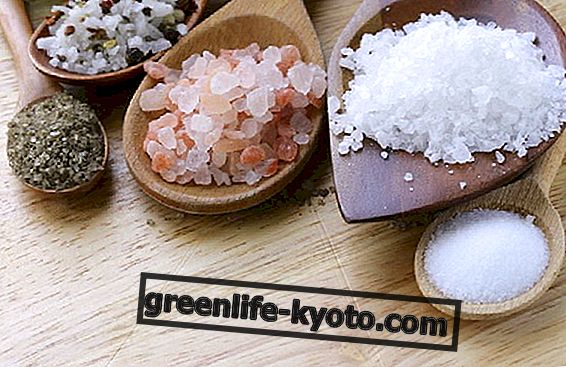Halitosis seems to be a negligible disorder, in reality it is a condition that greatly affects social life and the exercise of the communication skills of each of us. It can be caused by poor hygiene and or be a symptom of other more serious diseases. Let's find out better.
>
Anatomy of the oral cavity

Symptoms of halitosis
Bad breath can appear at certain times of the day, such as when you wake up. It is good to observe the frequency with which halitosis manifests itself in order to understand whether the problem is limited to isolated cases or is carried forward over time. Bad breath may be accompanied by inflamed or bleeding gums (in which case there may be dental caries or gum problems).
There is also an apparent psychological halitosis: the subject is convinced that he has a foul-smelling breath when it is not. The disturbance in this case is linked to self-confidence and the centering of one's personal power.
Causes
The main cause of halitosis is poor oral hygiene : the anaerobic bacteria that populate the mouth nest between fillings and dental spaces. Volatile and sulfur compounds are produced which make the breath unpleasant and give rise to transient halitosis, a physiological phenomenon that can be treated well through careful oral hygiene.
Inflammation of the oral cavity (stomatitis, gingivitis, tonsillitis) can give rise to bad breath, but these are less frequent causes.
Essentially, in addition to transient halitosis , we can speak of a second type of halitosis: persistent pathological halitosis caused by various diseases of the oral cavity and can derive from serious systemic diseases.
Diagnosis
Bad breath requires an accurate diagnosis by virtue of the multiple causes that can trigger it and that go from the banal ingestion of particular foods, such as garlic and onions, to pathologies with the possibility of chronicization. As already explained, the basic distinction is that between transient and persistent halitosis .
In the first case we are faced with a disorder that occurs only at certain times of the day. It is essentially a physiological phenomenon and responds very well to oral hygiene, through which anaerobic bacteria can be swept away, considered the main culprits together with gum disease, stress, smoking, dry mouth. In this case,
Persistent pathological halitosis : (concerns the remaining 10% of cases), unlike the former it does not disappear even after careful oral hygiene, as it is caused by serious systemic diseases such as diabetes mellitus, acute liver disease and chronic renal failure.
ALITOSIS CARE
Feeding in case of halitosis
After any meal, optimal oral hygiene should include thorough brushing that covers the dental arches, gums and the back of the tongue.
Foods that weigh down on digestion and require a lot of work from the body are all foods with industrial additives or transformations: white sugar, sweets, snacks, sugary drinks, refined flours, excess food of animal origin such as red meat and sausages and excess dairy products such as mozzarella and mature cheeses.
If the cause concerns an excessive stomach acidity, for the first few days during the acute attack it will be necessary to avoid also the fruit, which could ferment and thus increase the disturbance.
An acidifying diet must be contrasted with alkalizing foods that are all those containing vitamins and mineral salts such as seasonal fruits and vegetables.
To reduce and, when possible, avoid: milk and dairy products, a high consumption of meat (especially red) and refined foods.
Whole grains, vegetables, not too acid fruits and easily digestible proteins such as eggs and small fresh fish are to be preferred.
Phytotherapy for halitosis
In the case of transient halitosis, the ratania has shown interesting antibacterial and antifungal properties, which justifies its use in the form of mother tincture or as a substance in mouthwashes or toothpaste, in the treatment of gingivitis and stomatitis (inflammation of the mucous membrane of the mouth). It can also be helpful to sip hot water boiled for 10 minutes with fresh ginger : a remedy that promotes digestion and counteracts the accumulation of toxins and bacterial fermentation.
In the case of persistent halitosis, herbs and medicinal plants with a purifying and detoxifying action, such as the dandelion, can intervene in alleviating the disorder, but only after medical consultation.
You can explore all the properties and benefits of ginger

Bach flowers
Sometimes, the accumulation of toxins is reported by bad breath. A symptom that hides stress and emotional conflicts : halitosis removes others and can be an unconscious means of defense originating from affective insecurities.
Crab Apple is suitable for those with low self-esteem and feel the need to purify themselves. Indicative dosage: 4 drops 4 times a day.
Traditional Chinese Medicine
Bad breath in traditional Chinese medicine can depend on two factors: Stomach fire or qi deficiency in the Spleen . To disperse the Stomach Fire, work on the points:
HE GU (on the radial side of the index, at the midpoint of the second metacarpal) which tones up the qi ;
LIANG QIU (2 cun above the upper edge of the patella) which expels the Humidity-Cold that envelops the Yang of the Stomach;
NEI TING (0.5 cun behind the edge of the interdigital membrane, between II and III toes) which regulates qi and blocks pain;
WEI SHU (1.5 cun to the side of the thorny apophysis of the XII thoracic vertebra) which tones and regulates the Stomach and dissolves Humidity;
In the case of qi deficiency halitosis in the Spleen, the points to be used are:
FENG LONG (halfway between the inner edge of the kneecap and the vertex of the external malleolus), dissolves moisture, mobilizes the qi of the Spleen;
ZU SAN LI (under the lower edge of the patella, to the side of the anterior tibial crest), tones Spleen and Stomach;
PI SHU (point Shu of the back of the Spleen, located 1, 5 cun to the side of the spinous apophysis of the IX thoracic vertebra), mobilizes the qi of the Spleen;
Aromatherapy in case of halitosis
The essential oils used in aromatherapy for halitosis exploit the antibacterial action of these essences, thanks to their ability to neutralize microorganisms, which cause bad odors and the formation of plaque. 1 drop can also be used on the toothpaste to increase its antiseptic and deodorant action or to prepare mouthwashes.
- Essential oil of mint: refreshing, it is a disinfectant of the oral cavity, very useful to deodorize the breath, against halitosis, you can put 5-7 drops in half a glass of water for rinses and gargles.
- Myrrh essential oil: antiseptic and antibacterial, it is used to resolve problems related to the mouth, such as gingivitis, stomatitis, pyorrhea, canker sores. To make a lotion, put 5 drops of myrrh in a glass of warm water and do prolonged rinses, at least twice a day, against ulcerations and infections of the mouth and bad breath.
- Bergamot essential oil: antiseptic, disinfectant in case of abscesses and other infections and irritations of the oral cavity. In rinses, for gargling it is recommended against halitosis: in a glass of warm water put 5 drops of bergamot, take prolonged rinses, at least twice a day.
- Sage essential oil: has a purifying action, taken 2 drops in a teaspoon of honey, has detoxifying properties on the liver and kidneys, also useful for treating persistent halitosis due to the malfunctioning of these two excretory organs. Put 5 drops of sage in a glass of warm water. Make prolonged rinses, at least twice a day, against canker sores, weak and bleeding gums, in stomatitis and laryngitis.
Homeopathy
The homeopathic preparations for halitosis are: Carbonicum acidum 5 CH (5 granules, 2 times a day), since phenol is used in homeopathy in gingivostomatitis with fetid halitosis, often associated with gingival ulceration; Mercurius solubilis 9 CH (5 granules, once a day), also suitable for long-distance forms of fetid halitosis.
Learn more about homeopathic remedies to cure halitosis
Exercises
The best exercise to defend oneself from halitosis is to hold the toothbrush and practice with dental floss . Position the toothbrush at 45 ° to the gum, gently move it back and forth with short movements to clean one tooth at a time, brushing the outer and inner surfaces of the teeth. Use the tip of the toothbrush to clean the inner surface of the front teeth with a gentle movement from above to below for the upper ones and from the bottom to the top for the lower ones. To brush the chewing surface of the posterior teeth, a back and forth movement is required. Don't forget your tongue to remove bacteria and freshen your breath. To remove the plaque between the tooth and the tooth, floss is essential.
In case of halitosis it is very important to drink plenty of water during the day ; hydration is essential, especially if a lot of sport is practiced.
There is also a "ghost" halitosis based on a strong but unfounded conviction of the person. When, despite consulting with the dentist or hygienist, the subject is still obsessed by a non-existent conviction, we are faced with psychological distress ( halitophobia ). Those who live with this aspect tend to self-isolate and this can cause further stress that directly affects gastric function. The insecurity that underlies the disorder can be tackled with movement therapies such as bioenergetics. Furthermore, strengthening the emotional center is a process that connects to the strengthening of the core, the abdominal area, as Joseph H. Pilates would say, creator of the method designed specifically to improve balance, posture, alignment and body awareness.
Another useful exercise is irony . We invite you to joke openly about the belief that crowds your thoughts. Mime little serious expressions in the mirror, speak to your mouth and try to understand with your whole body what is telling you what comes out of you, or how much you can work with the essence that lives there through various ways, one above all, the movement.













